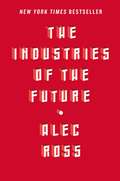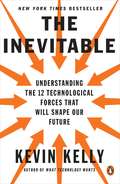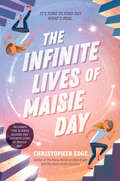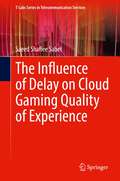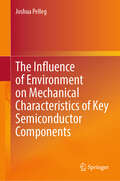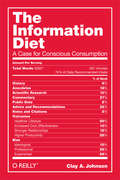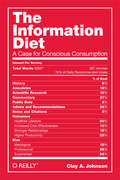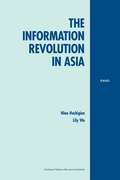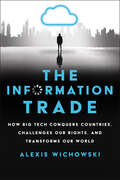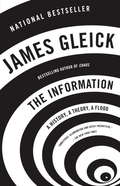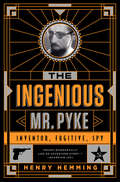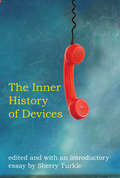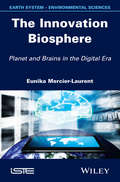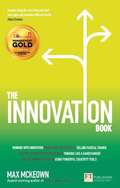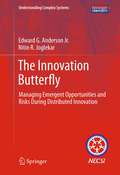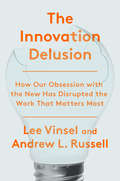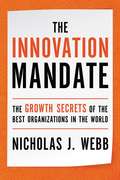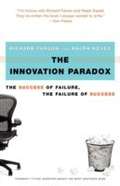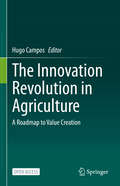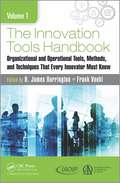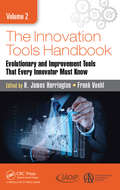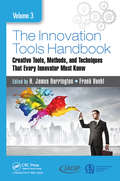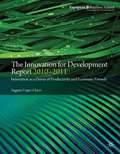- Table View
- List View
The Industries of the Future
by Alec RossLeading innovation expert Alec Ross explains what's next for the world: the advances and stumbling blocks that will emerge in the next ten years, and how we can navigate them.While Alec Ross was working as Senior Advisor for Innovation to the Secretary of State, he traveled to forty-one countries, exploring the latest advances coming out of every continent. From startup hubs in Kenya to R&D labs in South Korea, Ross has seen what the future holds. In The Industries of the Future, Ross shows us what changes are coming in the next ten years, highlighting the best opportunities for progress and explaining why countries thrive or sputter. He examines the specific fields that will most shape our economic future, including robotics, cybersecurity, the commercialization of genomics, the next step for big data, and the coming impact of digital technology on money and markets. In each of these realms, Ross addresses the toughest questions: How will we adapt to the changing nature of work? Is the prospect of cyberwar sparking the next arms race? How can the world's rising nations hope to match Silicon Valley in creating their own innovation hotspots? And what can today's parents do to prepare their children for tomorrow? Ross blends storytelling and economic analysis to give a vivid and informed perspective on how sweeping global trends are affecting the ways we live. Incorporating the insights of leaders ranging from tech moguls to defense experts, The Industries of the Future takes the intimidating, complex topics that many of us know to be important and boils them down into clear, plainspoken language. This is an essential book for understanding how the world works--now and tomorrow--and a must-read for businesspeople in every sector, from every country.
The Inevitable: Understanding the 12 Technological Forces That Will Shape Our Future
by Kevin Kelly<P>From one of our leading technology thinkers and writers, a guide through the twelve technological imperatives that will shape the next thirty years and transform our lives. <P>Much of what will happen in the next thirty years is inevitable, driven by technological trends that are already in motion. In this fascinating, provocative new book, Kevin Kelly provides an optimistic road map for the future, showing how the coming changes in our lives--from virtual reality in the home to an on-demand economy to artificial intelligence embedded in everything we manufacture--can be understood as the result of a few long-term, accelerating forces. <P>Kelly both describes these deep trends--interacting, cognifying, flowing, screening, accessing, sharing, filtering, remixing, tracking, and questioning--and demonstrates how they overlap and are codependent on one another. These larger forces will completely revolutionize the way we buy, work, learn, and communicate with each other. <P>By understanding and embracing them, says Kelly, it will be easier for us to remain on top of the coming wave of changes and to arrange our day-to-day relationships with technology in ways that bring forth maximum benefits. <P>Kelly's bright, hopeful book will be indispensable to anyone who seeks guidance on where their business, industry, or life is heading--what to invent, where to work, in what to invest, how to better reach customers, and what to begin to put into place--as this new world emerges <P><b>A New York Times Bestseller</b>
The Infinite Lives of Maisie Day
by Christopher EdgeAs in Madeleine L'Engle's A Wrinkle in Time, math and science inform this mind-bending mystery about a girl who must work with the laws of the universe and trust the love of her family if she is to set her world right.It's the morning of Maisie's tenth birthday, and she can't wait to open her presents. Maisie is not a typical kid. What she wants most for her birthday are the things she needs to build her own nuclear reactor. But she wakes to an empty house, and outside the front door is nothing but an unsettling, all-consuming blackness--a shifted reality. Even for super-smart Maisie, these puzzling circumstances seem out of her control . . . or are they?A CLIP Carnegie Medal Children's Book Award Nominee"A heartbreaking, head-melting science fiction mystery from the superlative Christopher Edge."--The Guardian"[Edge] . . . has a magical way of distilling difficult concepts [like] relativity, gravity, time and space, infinity. . . .He weaves these ideas into a high-energy thriller."--The Times (UK)"Gripping, terrifying and eye-poppingly original. Grabs hold of your brain--then tugs at your heart." --Jonathan Stroud, author of the bestselling Bartimaeus Trilogy
The Influence of Chemistry on New Foods and Traditional Products
by Arpan Bhagat Giorgia Caruso Salvatore Parisi Giampiero Barbieri Caterina Barone Zachary Ryan ConleyThis Brief concerns the influence of chemistry in the modern food and beverages industry. The world of traditional foods has been soundlessly but increasingly interconnected with the chemical industry in the last century. Different areas are considered in a multidisciplinary approach: - the production of chemical additives and of non-food components needed in the food industry (e. g. packaging materials) - the regulatory perspective of the whole food production chain - commercialization of food commodities - the problem of food safety from the viewpoint of official auditors with medical or veterinarian competencies - new and emerging risks related to food packaging materials - the assessment of the authenticity of edible products. This Brief includes different viewpoints, ranging from the management of allergens and food additives in the food plant to the complex matter of the formulation of traditional products with the consequent production of "alternative" versions of the same food.
The Influence of Delay on Cloud Gaming Quality of Experience (T-Labs Series in Telecommunication Services)
by Saeed Shafiee SabetThis book provides an understanding of the impact of delay on cloud gaming Quality of Experience (QoE) and proposes techniques to compensate for this impact, leading to a better gaming experience when there are network delays. The author studies why some games in the cloud are more delay sensitive than others by identifying game characteristics influencing a user's delay perception and predicting the gaming QoE degraded by the delay. The author also investigates the impact of jitter and serial-position effects on gaming QoE and delay. Using the insight gained, the author presents delay compensation techniques that can mitigate the negative influence of delay on gaming QoE that use the game characteristics to adapt the games.
The Influence of Environment on Mechanical Characteristics of Key Semiconductor Components
by Joshua PellegThis book provides a comprehensive overview of the impact of environmental constituents on the mechanical properties of semiconductors. Chapter 1 sets the stage by outlining the various environmental constituents that can have deleterious effects on both the mechanical properties of materials and the health of those who handle them. This includes gases such as oxygen, nitrogen, hydrogen, air, and moisture in the air, some of which are responsible for greenhouse gas emissions that directly affect the climate. Chapters 2 through 12 delve into specific aspects of mechanical behavior, including elastic properties, plastic deformation, defects, hardness, brittle behavior, impact testing, deformation processes, and time-dependent deformation. The book also examines how the behavior of semiconductors differs at the nano scale and provides insights into improving their mechanical properties. This book is a valuable resource for researchers, engineers, and students inthe fields of materials science and engineering, semiconductor technology, and nanotechnology. It highlights the urgent need to assess the global environmental impacts of these materials and suggests alternate uses for their production in order to preserve life on earth.
The Information Diet
by Clay A. JohnsonThe modern human animal spends upwards of 11 hours out of every 24 in a state of constant consumption. Not eating, but gorging on information ceaselessly spewed from the screens and speakers we hold dear. Just as we have grown morbidly obese on sugar, fat, and flour--so, too, have we become gluttons for texts, instant messages, emails, RSS feeds, downloads, videos, status updates, and tweets. We're all battling a storm of distractions, buffeted with notifications and tempted by tasty tidbits of information. And just as too much junk food can lead to obesity, too much junk information can lead to cluelessness. The Information Diet shows you how to thrive in this information glut--what to look for, what to avoid, and how to be selective. In the process, author Clay Johnson explains the role information has played throughout history, and why following his prescribed diet is essential for everyone who strives to be smart, productive, and sane. In The Information Diet, you will: Discover why eminent scholars are worried about our state of attention and general intelligence Examine how today's media--Big Info--give us exactly what we want: content that confirms our beliefs Learn to take steps to develop data literacy, attention fitness, and a healthy sense of humor Become engaged in the economics of information by learning how to reward good information providers Just like a normal, healthy food diet, The Information Diet is not about consuming less--it's about finding a healthy balance that works for you
The Information Diet: A Case for Conscious Comsumption
by Clay A. JohnsonThis is a softcover version of the title released in 2011; there is no new material.The modern human animal spends upwards of 11 hours out of every 24 in a state of constant consumption. Not eating, but gorging on information ceaselessly spewed from the screens and speakers we hold dear. Just as we have grown morbidly obese on sugar, fat, and flour—so, too, have we become gluttons for texts, instant messages, emails, RSS feeds, downloads, videos, status updates, and tweets.We're all battling a storm of distractions, buffeted with notifications and tempted by tasty tidbits of information. And just as too much junk food can lead to obesity, too much junk information can lead to cluelessness. The Information Diet shows you how to thrive in this information glut—what to look for, what to avoid, and how to be selective. In the process, author Clay Johnson explains the role information has played throughout history, and why following his prescribed diet is essential for everyone who strives to be smart, productive, and sane.In The Information Diet, you will:Discover why eminent scholars are worried about our state of attention and general intelligenceExamine how today’s media—Big Info—give us exactly what we want: content that confirms our beliefsLearn to take steps to develop data literacy, attention fitness, and a healthy sense of humorBecome engaged in the economics of information by learning how to reward good information providersJust like a normal, healthy food diet, The Information Diet is not about consuming less—it’s about finding a healthy balance that works for you
The Information Diet: A Case for Conscious Consumption
by Clay A. JohnsonThe modern human animal spends upwards of 11 hours out of every 24 in a state of constant consumption. Not eating, but gorging on information ceaselessly spewed from the screens and speakers we hold dear. Just as we have grown morbidly obese on sugar, fat, and flour—so, too, have we become gluttons for texts, instant messages, emails, RSS feeds, downloads, videos, status updates, and tweets.We're all battling a storm of distractions, buffeted with notifications and tempted by tasty tidbits of information. And just as too much junk food can lead to obesity, too much junk information can lead to cluelessness. The Information Diet shows you how to thrive in this information glut—what to look for, what to avoid, and how to be selective. In the process, author Clay Johnson explains the role information has played throughout history, and why following his prescribed diet is essential for everyone who strives to be smart, productive, and sane.In The Information Diet, you will:Discover why eminent scholars are worried about our state of attention and general intelligenceExamine how today’s media—Big Info—give us exactly what we want: content that confirms our beliefsLearn to take steps to develop data literacy, attention fitness, and a healthy sense of humorBecome engaged in the economics of information by learning how to reward good information providersJust like a normal, healthy food diet, The Information Diet is not about consuming less—it’s about finding a healthy balance that works for you
The Information Revolution in Asia
by Nina Hachigian Lily WuThis report discusses the information revolution in the Asia-Pacific region and its likely course over the next five to ten years. Key questions addressed in this report include the extent to which the information revolution has taken hold of markets in this region, the political implications of the information revolution for Asian governments, the variations between individual countries, and the prospects for further information-technology-related developments in the region.
The Information Trade: How Big Tech Conquers Countries, Challenges Our Rights, and Transforms Our World
by Alexis Wichowski"A timely, compelling, and expertly researched passport to the tech companies that rule today's digital landscape."—Blake Harris, bestselling author of Console Wars and The History of the Future.In this provocative book about our new tech-based reality, political insider and tech expert Alexis Wichowski considers the unchecked rise of tech giants like Facebook, Google, Amazon, Apple, Microsoft, and Tesla—what she calls “net states”— and their unavoidable influence in our lives. Rivaling nation states in power and capital, today’s net states are reaching into our physical world, inserting digital services into our lived environments in ways both unseen and, at times, unknown to us. They are transforming the way the world works, putting our rights up for grabs, from personal privacy to national security. Combining original reporting and insights drawn from more than 100 interviews with technology and government insiders, including Microsoft president Brad Smith, Google CEO Eric Schmidt, the former Federal Trade Commission chair under President Obama, and the managing director of Jigsaw—Google’s Department of Counter-terrorism against extremism and cyber-attacks—The Information Trade explores what happens we give up our personal freedom and individual autonomy in exchange for an easy, plugged-in existence, and shows what we can do to control our relationship with net states before they irreversibly change our future.
The Information: A History, a Theory, a Flood
by James GleickJames Gleick, the author of the best sellers Chaos and Genius, now brings us a work just as astonishing and masterly: a revelatory chronicle and meditation that shows how information has become the modern era's defining quality--the blood, the fuel, the vital principle of our world. The story of information begins in a time profoundly unlike our own, when every thought and utterance vanishes as soon as it is born. From the invention of scripts and alphabets to the long-misunderstood talking drums of Africa, Gleick tells the story of information technologies that changed the very nature of human consciousness. He provides portraits of the key figures contributing to the inexorable development of our modern understanding of information: Charles Babbage, the idiosyncratic inventor of the first great mechanical computer; Ada Byron, the brilliant and doomed daughter of the poet, who became the first true programmer; pivotal figures like Samuel Morse and Alan Turing; and Claude Shannon, the creator of information theory itself. And then the information age arrives. Citizens of this world become experts willy-nilly: aficionados of bits and bytes. And we sometimes feel we are drowning, swept by a deluge of signs and signals, news and images, blogs and tweets. The Information is the story of how we got here and where we are heading.From the Hardcover edition.
The Ingenious Mr. Pyke: Inventor, Fugitive, Spy
by Henry HemmingThis is the extraordinary story of Geoffrey Pyke, an inventor, war reporter, escaped prisoner, campaigner, father, educator--and all-around misunderstood genius. In his day, he was described as one of the world's great minds, to rank alongside Einstein, yet he remains virtually unknown today. Pyke was an unlikely hero of both world wars and, among many other things, is seen today as the father of the U. S. Special Forces. He changed the landscape of British pre-school education, earned a fortune on the stock market, wrote a bestseller and in 1942 convinced Winston Churchill to build an aircraft carrier out of reinforced ice. He escaped from a German WWI prison camp, devised an ingenious plan to help the Republicans in the Spanish Civil War, and launched a private attempt to avert the outbreak of the Second World War by sending into Nazi Germany a group of pollsters disguised as golfers. Despite his brilliance, Pyke ultimately could not find peace, committing suicide in 1948. Yet the full scope of his story remained secret even after his death: in 2009, MI5 released a mass of material suggesting that Pyke was in fact a senior official in the Soviet Comintern. In 1951 papers relating to Pyke were found in the flat of "Cambridge Spy' Guy Burgess after his defection to Moscow. MI5 had "watchers" follow Pyke through the bombed-out streets of London, his letters were opened and listening devices picked up clues to his real identity. Convinced he was a Soviet agent codenamed Professor P, MI5 helped to bring his career to an end. It is only now, more than sixty years after his death, that Geoffrey Pyke's astonishing story can be told in full. The Ingenious Mr. Pyke is a many-faceted account of this enigmatic man’s genius, and reveals him as one of the great innovators of the last century.
The Inner History of Devices (The\mit Press Ser.)
by Sherry TurkleMemoir, clinical writings, and ethnography inform new perspectives on the experience of technology; personal stories illuminate how technology enters the inner life.For more than two decades, in such landmark studies as The Second Self and Life on the Screen, Sherry Turkle has challenged our collective imagination with her insights about how technology enters our private worlds. In The Inner History of Devices, she describes her process, an approach that reveals how what we make is woven into our ways of seeing ourselves. She brings together three traditions of listening—that of the memoirist, the clinician, and the ethnographer. Each informs the others to compose an inner history of devices. We read about objects ranging from cell phones and video poker to prosthetic eyes, from Web sites and television to dialysis machines. In an introductory essay, Turkle makes the case for an “intimate ethnography” that challenges conventional wisdom. One personal computer owner tells Turkle: “This computer means everything to me. It's where I put my hope.” Turkle explains that she began that conversation thinking she would learn how people put computers to work. By its end, her question has changed: “What was there about personal computers that offered such deep connection? What did a computer have that offered hope?” The Inner History of Devices teaches us to listen for the answer. In the memoirs, ethnographies, and clinical cases collected in this volume, we read about an American student who comes to terms with her conflicting identities as she contemplates a cell phone she used in Japan (“Tokyo sat trapped inside it”); a troubled patient who uses email both to criticize her therapist and to be reassured by her; a compulsive gambler who does not want to win steadily at video poker because a pattern of losing and winning keeps her more connected to the body of the machine. In these writings, we hear untold stories. We learn that received wisdom never goes far enough.
The Innovation Biosphere
by Eunika Mercier-LaurentThis book addresses those involved in research or R&D. It introduces the principles of eco-innovation and the importance of the impact of their activity. This topic is considered in the context of natural and digital ecosystems powered by intelligent assistants (technology). Chapter 1 positions the innovation as a process and component of ecosystems including research, enterprises, technology (digitalecosystems) and environment. Sustainable success is a condition of survival and an expectation of those who invest in innovation. Chapter 2 describes the main elements to consider and gives some tips. Chapter 3 presents some selected initiatives at the national and European level and provides a way of measuring success.
The Innovation Book: How To Manage Ideas and Execution for Outstanding Results
by Max MckeownINNOVATION IN ACTION <p> The Innovation Book is your roadmap to creating powerful innovations that deliver success in a competitive world. <p><p> It answers the following questions: <p>· How do you become a more innovative thinker? <p>· How do you lead and manage creative people? <p>· How can you use innovation tools to get the best results? <p>· How can you engage people with innovation? <p>· How do you avoid pitfalls, problems and screw-ups? <p><p> With a practical bite-size format, The Innovation Book will help you tackle the really important challenges and seize the most valuable opportunities.
The Innovation Butterfly
by Nitin R. Joglekar Edward G. Anderson Jr.Product and service innovations are the result of mutually interacting creative and coordination tasks within a system that has to balance technical decisions, marketplace taste, personnel management, and stakeholder commitment. The constituent elements of such systems are often scattered across multiple firms and across the globe and constitute a complex system consisting of many interacting parts. In the spirit of the "butterfly effect", metaphorically describing the sensitivity to initials conditions of chaotic systems, this book builds an argument that "innovation butterflies" can, in the short term, take up significant amounts of effort and sap efficiencies within individual innovation projects. Such "innovation butterflies" can be prompted by external forces such as government legislation or unexpected spikes in the price of basic goods (such as oil), unexpected shifts in market tastes, or from a company manager's decisions or those of its competitors. Even the smallest change, the smallest disruption, to this system can steer a firm down an unpredictable and irreversibly different path in terms of technology and market evolution. In the long term, they can shift the balance of the entire innovation portfolio into unplanned directions. More importantly, we describe how innovation leaders can influence the emergent behavior of the system for good or ill. The first half of the book draws parallels from physics, economics, and sociology as well as evidence from multiple industries to describe the structural and behavioral causes of emergent phenomena in innovation settings as well as their often negative impacts. In the second half of the book, we turn to distributed management of innovation under emergence. We show that innovation butterflies, if improperly managed, most often lead to negative outcomes. On the other hand, it is also argued that while the complexity of the innovation system and the desire to experiment and try new and emergent alternatives precludes precise planning, innovation leaders can actually tame innovation butterflies through the design and implementation of appropriate processes, strategies, tools and leadership choices.
The Innovation Delusion: How Our Obsession with the New Has Disrupted the Work That Matters Most
by Andrew L. Russell Lee VinselInnovation is the hottest buzzword in business. But what if our obsession with finding the next big thing has distracted us from the work that matters most?&“The most important book I&’ve read in a long time . . . It explains so much about what is wrong with our technology, our economy, and the world, and gives a simple recipe for how to fix it: Focus on understanding what it takes for your products and services to last.&”—Tim O&’Reilly, founder of O&’Reilly Media It&’s hard to avoid innovation these days. Nearly every product gets marketed as being disruptive, whether it&’s genuinely a new invention or just a new toothbrush. But in this manifesto on thestate of American work, historians of technology Lee Vinsel and Andrew L. Russell argue that our way of thinking about and pursuing innovation has made us poorer, less safe, and—ironically—less innovative. Drawing on years of original research and reporting, The Innovation Delusion shows how the ideology of change for its own sake has proved a disaster. Corporations have spent millions hiring chief innovation officers while their core businesses tank. Computer science programs have drilled their students on programming and design, even though theoverwhelming majority of jobs are in IT and maintenance. In countless cities, suburban sprawl has left local governments with loads of deferred repairs that they can&’t afford to fix. And sometimes innovation even kills—like in 2018 when a Miami bridge hailed for its innovative design collapsed onto a highway and killed six people. In this provocative, deeply researched book, Vinsel and Russell tell the story of how we devalued the work that underpins modern life—and, in doing so, wrecked our economy and public infrastructure while lining the pockets of consultants who combine the ego of Silicon Valley with the worst of Wall Street&’s greed. The authors offer a compelling plan for how we can shift our focus away from the pursuit of growth at all costs, and back toward neglected activities like maintenance, care, and upkeep. For anyone concerned by the crumbling state of our roads and bridges or the direction our economy is headed, The Innovation Delusion is a deeply necessary reevaluation of a trend we can still disrupt.
The Innovation Mandate: The Growth Secrets of the Best Organizations in the World
by Nicholas WebbIn clear language, The Innovation Mandate shows leaders a step-by-step process to continually generate great ideas, implement them, and maximize their value to benefit both customers and investors.In today’s ultracompetitive marketplace, the difference between success and failure is innovation. From small entrepreneurial startups to global Fortune 500 companies, innovation--the steady flow of new ideas--drives sustained success. It allows a company to introduce new products and services, effectively connect with customers, sharpen the supply chain, efficiently manage finances, and hire and retain the best people. Without a steady stream of new ideas, even the best company will slow down, atrophy, lose market share, hemorrhage customers, and eventually close or be sold. The Innovation Mandate offers a clear and straightforward pathway to profitable innovation. It demystifies the concept, making it easy to understand, implement, and measure. The book centers around three simple concepts: innovation generates profits; innovation, in the form of new, profitable ideas, can come from anywhere; and identifying, harnessing, evaluating, and implementing these new ideas cannot be left to chance. Additionally, the book offers a five-point checklist to ensure your company is innovation ready.
The Innovation Paradox: The Success of Failure, the Failure of Success
by Richard Farson Ralph KeyesAuthors argue that failure has its upside, success its downside. Both are steps toward achievement, and the two extremes are not as distinct as we imagine. In today's business economy, it's not success or failure -- it's success and failure that lead to genuine innovation.
The Innovation Revolution in Agriculture: A Roadmap to Value Creation
by Hugo CamposThis open access book is an important reframing of the role of innovation in agriculture. Dr. Campos and his distinguished coauthors address the need for agriculture to feed a growing global population with a reduced environmental footprint while adapting to and mitigating the effects of changing climate. The authors expand the customary discussion of innovation in terms of supply driven R&D to focus on the returns to investors and most importantly, the value to end-users. This is brought to life by exploring effective business models and many cases from agricultural systems across the globe. The focus on converting the results of innovation in R&D into adoption by farmers and other end-users is its greatest contribution. Many lessons from the book can be applied to private and public sectors across an array of agricultural systems. This book will be of enormous value to agri-business professionals, NGO leaders, agricultural and development researchers and those funding innovation and agriculture across the private and public sectors. Tony Cavalieri, Senior Program Officer, Bill & Melinda Gates Foundation Hugo Campos, Ph.D., MBA, has 20+ years of international corporate and development experience. His distinguished coauthors represent a rich collection of successful innovation practice in industry, consultancy, international development and academy, in both developed and developing countries.”
The Innovation Tools Handbook, Volume 1: Organizational and Operational Tools, Methods, and Techniques that Every Innovator Must Know
by H. James Harrington Frank VoehlIn today‘s fast-moving, high-technology environment, the focus on quality has given way to a focus on innovation. From presidents of the United States to presidents of Fortune 500 companies, it is clear that everyone thinks innovation is extremely important. The challenge is that few people stop to define why innovation is important to understand w
The Innovation Tools Handbook, Volume 2: Evolutionary and Improvement Tools that Every Innovator Must Know
by H. James Harrington Frank VoehlIn today’s fast-moving, high-technology environment, the focus on quality has given way to a focus on innovation. From presidents of the United States to presidents of Fortune 500 companies, it is clear that everyone thinks innovation is extremely important. The challenge is that few people stop to define why innovation is important—to understand what’s driving the need for more innovation. We all agree that more frequent innovation is important, even necessary.There is actually a growing body of evidence that indicates that looking outside of your company (rather than purely looking internally) and to customers’ needs, using the tools in this Handbook, will lead to more innovative ideas. Responding to customers’ needs is the key to a successful business. You can use these tools to talk to customers—satisfied ones, unsatisfied ones, potential customers, people who would never buy your product or service, and also people you have never considered as a potential customer. In addition, these tools will help you ask your competitors’ customers about what makes them happy with the current businesses and offerings in the industry, why they buy or do not buy from you, your competitors, and other industries. These tools will help you understand the steps in the customer journey they need to take, what delights and frustrates them, and what their pain points are.The three volumes of The Innovation Tools Handbook cover 76 top-rated tools and methods, from the hundreds available, that every innovator must master to be successful. Covering evolutionary and/or improvement innovative tools and methodologies, Volume 2 presents 23 tools/methodologies related to innovative evolutionary products, processes, and services, or the improvement of existing ones.For each tool, the book provides a definition, identifies the user of the tool, explains what phases of the innovation process the tool is used, describes how the tool is used, supplies examples of the outputs from the tool, identifies software that can maximize its effectiveness, and includes references and suggestions for further reading. Ideation is about developing ideas on how to seize identified opportunities. What are the possible answers to your breakthrough questions? Having a deep understanding about the customer, their needs and pain points, as well as the existing solutions (i.e. business models in the industry) will naturally lead to new ideas. How seriously you do your discovery homework using the tools in these Handbooks will determine not only how fast you create ideas, but about how likely these ideas are to succeed.Tools and methodologies covered include: 5 why questions, Affinity diagrams, attribute listing, brainwriting 6–3–5, cause-and-effect diagrams, creative problem solving model, design for tools, flowcharting, force field analysis, Kano analysis, nominal group technique, plan–do–check–act, reengineering/redesign, reverse engineering, robust design, SCAMPER, simulations, six thinking hats, social networks, solution analysis diagrams, statistical analysis, tree diagram, and value analysis.The authors believe that by making effective use of the tools and methodologies presented in this book, your organization can increase the percentage of creative/innovative ideas by five to eight times its present performance level.
The Innovation Tools Handbook, Volume 3: Creative Tools, Methods, and Techniques that Every Innovator Must Know
by H. James Harrington and Frank VoehlThis book focuses on the creative tools and techniques, decisions, activities, and practices that move ideas to realization generate business value. It has a unique leaning on learning and mastering the improvement tools for managing the investment in creating new opportunities for generating customer value. It includes the discipline of managing the creative tools, methods and processes involved in innovation. It can be used to develop both product and organizational innovation. This Handbook includes a set of tools that allow managers and engineers to cooperate with a common understanding of goals and processes.
The Innovation for Development Report 2010—2011
by Augusto López-ClarosThis report provides a comprehensive look at the role of innovation in promoting economic and social development. It examines the impact of innovation on the economic growth of developing countries and the future role of technological innovation in international efforts to mitigate the effects of climate change, amongst many other issues.
